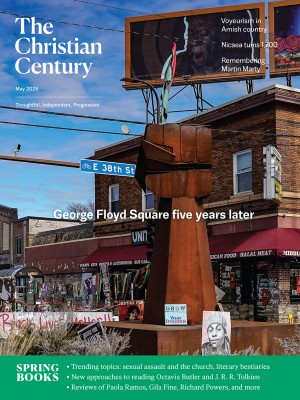Resurrection, then breakfast
Jesus conquers death so he can come back and enjoy another meal, lingering with his friends for as long as he can.

Century illustration (Source images: Public domain and Met Museum, NY)
Resurrection is supposed to mean a new world. Easter is supposed to mark a new beginning, a new creation—the old passing away, all things reborn. How do the first disciples respond to Christ’s triumph over death? They return to the humdrum of their jobs. They go fishing.
At the end of John’s Gospel, we find the disciples at the sea of Tiberias. Peter says he’s going fishing, and the others reply, “We will go with you” (21:3). After the resurrection has unsettled what they thought about the world, after the shock of everything that has just happened—Jesus, fresh from the tomb, appeared to Mary Magdalene and then surprised the fearful disciples in their locked room (20:1–23)—the disciples are back at work.
Read our latest issue or browse back issues.
The cosmos has been altered. There has been a shift in existence. Another world has broken through into this one. An ontological revolution is in effect. “Up from the grave He arose / With a mighty triumph o’er His foes.” And the disciples go fishing. The crucified Jesus walks out of the tomb, and the disciples figure that now is as good a time as any to pull an overnight shift at sea.
In this Easter story—and in our lives, as Easter people—I can’t say that I see the kind of decisive shift, the momentous change in the nature of things, that I might expect when a friend comes back from the dead. Life goes on as more or less the same for the disciples. Their world of social relations has a recognizable form. After Easter morning, there’s still the oppression of the Roman Empire, there’s still work, and there’s still breakfast.
The breakfast scene is bewildering in how ordinary it is. We find Jesus on the seashore, making food and lounging with his friends after their long night of work. And the disciples are acting completely normal—just finishing up another shift of work, counting fish, as their dear friend Jesus, once dead but now alive, cooks up a breakfast feast.
I’ve always loved the detail of how many fish they catch: 153, we’re told (21:11). Apparently one of the disciples takes the time to count. The narrator could note in passing that there are more than 100, or about 150. That would be adequate to unfold the scene—no need for precision. Alternatively, I can’t imagine any of us would chastise the disciples if they exaggerated a little, as people who catch fish are reputed to do, and said there were 200. That would be a fitting number, reasonable, easy to remember.
Instead we get an exact count, every fish tallied: 153. I like David James Duncan’s exegesis of this number in his 1983 novel The River Why. The passage is long but worth every line:
How was this digit discovered? Mustn’t it have happened thus: upon hauling the net to shore, the disciples squatted down by that immense, writhing fish pile and started tossing them into a second pile, painstakingly counting “one, two, three, four, five, six, seven . . .” all the way up to a hundred and fifty and three, while the newly risen Lord of Creation, the Sustainer of their beings, He who died for them and for Whom they would gladly die, stood waiting, ignored, till the heap of fish was quantified. Such is the fisherman’s compulsion toward rudimentary mathematics!
Duncan captures the realism of the narrative. The disciples are fishermen, after all. Every one of those fish is money in the pocket. So of course they count them.
God’s revolution has begun. Resurrection changes everything. And we find the disciples at the jobsite—back at the same old boat in the same old sea doing the same old thing. What’s odd about this Easter appearance of the resurrected Jesus is that it is not odd at all. It’s so mundane. The disciples are at work. They bring their catch to the shore, they count the fish, and Jesus makes them breakfast.
Maybe that’s just the point: Jesus at breakfast with his friends. It sounds underwhelming as a reason for the resurrection—that Jesus conquers death so he can come back and be with his disciples, enjoy another meal, fellowship around the fire, linger with his friends for as long as he can. But that’s what God has wanted from eternity: to be with us. Jesus returns from the dead because he wants another meal with his disciples—nothing too special, just some fish and bread passed around a charcoal fire (21:12–13).
The Easter gospel is about that kind of ordinariness: Jesus, coming back from the dead to be with us as a gentle presence, nothing flashy, just there—here. Christ is a steady and quiet here-ness, usually taken for granted, like our heartbeat, which we hardly notice because it’s so dependable. God’s love is an unassuming pulse at the heart of our lives. The crucified Jesus is now resurrected, and he wants nothing more than to feast with his friends.







